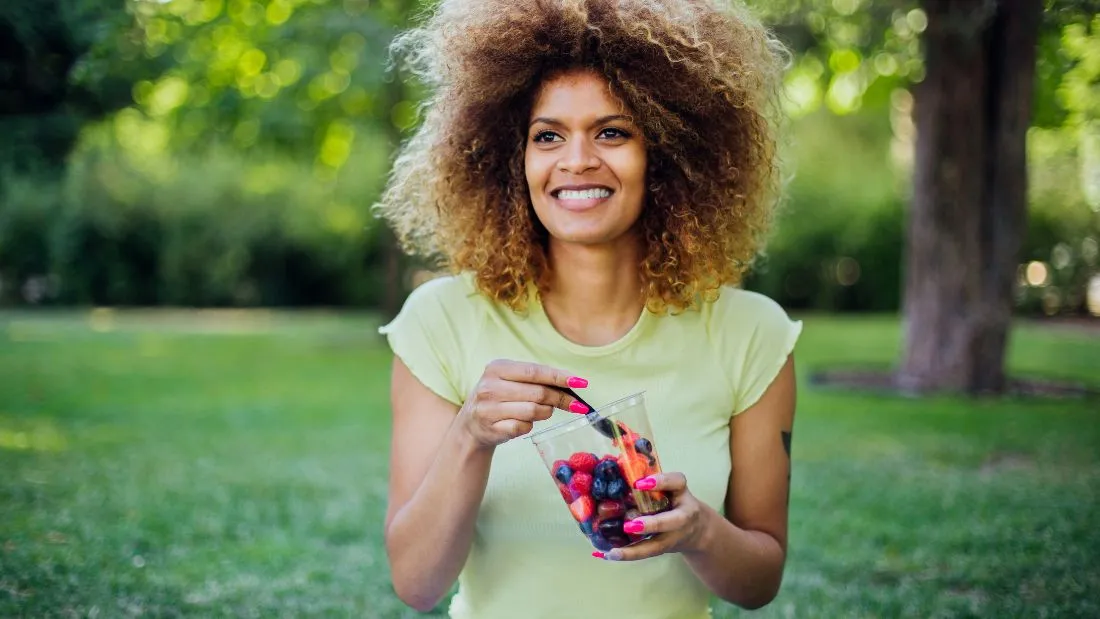Nourish your skin from within

Your skin reflects what’s going on in your life only too well and when your diet is lacklustre, it’s likely that your skin will be as well. What you eat affects your skin and there’s a lot you can do to nourish it and make it healthier.
Daily dose of antioxidants
Brightly coloured foods such as fresh fruit and vegetables, turmeric, black and kidney beans, red lentils, pistachios, wild rice and black sesame are great for your skin as they supply a wealth of antioxidants. As well as supporting your overall health, antioxidants also do wonders for the skin! They help protect skin cells from damage and tone down any inflammation. Many face creams and serums contain antioxidants but it’s much more effective to ensure a steady supply through your diet.
Antioxidant-rich foods also tend to be wholefoods and therefore provide plenty of essential nutrients but no nasties that would be bad for your skin.
C is for collagen
Citrus fruit, broccoli, peppers, tomatoes, berries, kiwi fruit and even potatoes provide vitamin C, the antioxidant vitamin that’s also vital for collagen formation. Collagen is the protein that helps your skin stay supple.
Many people choose to take collagen supplements – which are never vegan, by the way – but as collagen is a protein, it gets broken down in the digestive system and the body uses its amino acids for whatever is needed. If you have enough plant protein and vitamin C in your diet, your body will make plenty of its own collagen.
Vitamin E
Your skin needs vitamin E to be healthy and resilient. It is a strong antioxidant that protects the skin cells and also helps your skin to heal. You may have noticed that many face creams contain vitamin E and it’s not a coincidence but supplying it from within is far better because it has longer-lasting effects.
The best sources of vitamin E are almonds, sunflower seeds, hazelnuts, avocado, tomatoes, wheat germ and butternut squash.
Beautiful beta-carotene
Red, orange or yellow fruit and vegetables contain beta-carotene, the pigment responsible for those bright colours. Your body turns beta-carotene into vitamin A, which is essential for healthy skin, mucous membranes and vision. It is also an antioxidant and helps to protect your skin and combat inflammation.
The best sources of vitamin A are carrots, pumpkins and squashes, tomatoes, red and orange peppers, sweet potatoes, apricots, peaches and nectarines, mango and cantaloupe melon and – perhaps surprisingly – green leafy veggies such as broccoli, kale, rocket and spinach.
B group for the win
All B vitamins are vital for myriad reactions in your body and also for maintaining skin health. If you are low in B vitamins, you may experience skin irritation, dry patches, cracked lips and mouth corners, breakouts and more.
A healthy vegan diet supplies plenty of B vitamins so long as it contains wholegrains, pulses, nuts and seeds and leafy greens. For an extra boost, add wheat germ and nutritional yeast!
For vitamin B12, you have to reach for a supplement – but you should be taking this anyway as our diet doesn’t provide enough and we all need a regular supply, regardless of what your skin looks like!
Not so sweet
When you’ve eaten a lot of cake, biscuits or chocolate, you can expect pimples pretty soon. Eating too much sugar makes your body produce more of the hormone insulin and stimulates inflammation. The combined effects make your skin prone to breakouts so reducing your sugar intake can make a big difference to your skin.
It’s not just sugar that has this effect – sweet and alcoholic drinks, sugar-laden cereals and white flour products (white bread, pastries or pies) also contribute. On the other hand, natural sugars found in fruit are fine and wholegrain products can easily replace the white ones – think wholemeal bread, whole wheat pasta or oat cakes.
Processed foods
Processed foods that are high in fat or sugar (or both) encourage inflammatory reactions in the skin – leading to breakouts – while providing nothing nutritionally useful. The same applies to deep-fried foods and eating these types of foods not only does a disservice to your skin, it also replaces healthier, more nourishing meals.
There’s no need to avoid naturally fatty foods, such as nuts or seeds, olives or avocadoes – they are healthy and can even help your skin look better thanks to their vitamins, minerals, antioxidants, healthy fats and complex carbohydrates.
Hydrate
Your skin needs water just like the rest of your body to stay healthy. Water, tea, fresh fruit and vegetables all provide it and help your skin to stay supple.
If you overindulge in salty or sugary foods, drink plenty of water to help your body restore its balance – you’ll feel better for it.
Mineral care
Zinc is a mineral often added to skin treatments because it helps your skin to heal. It’s also essential for making new cells and for the immune system in its daily fight against dangerous invaders. A steady supply of zinc is just as important for your skin health as it is for your immune system. The best sources include pumpkin seeds, sesame seeds and tahini, tofu, tempeh, lentils and wholegrains.
Feed your skin well
As you probably know, your skin reacts to any diet changes pretty fast, which is both good and bad news. If you eat well, hydrate and get enough sleep, your skin will reward you. Hormonal changes and some medications can have a negative effect on your skin too so bear that in mind when looking for problem causes.




